|
|
|
Sort Order |
|
|
|
Items / Page
|
|
|
|
|
|
|
| Srl | Item |
| 1 |
ID:
184142
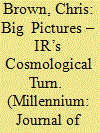

|
|
|
| 2 |
ID:
073986
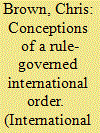

|
|
|
|
|
| Publication |
2006.
|
| Summary/Abstract |
Differences between American and European conceptions of a rule-governed international order can be observed via an examination of the legal regimes governing the conduct of American and British troops in Iraq. In principle, the US military authorities recognise the authority of international humanitarian law with respect to, for example, the treatment of prisoners and the distinction between combatants and non-combatants, but in other respects they are able to prosecute the war against the insurgency in a conventional way. British troops, on the other hand, are obliged to act in accordance with a much more restrictive legal regime, based on changes introduced subsequent to Britain's membership of the International Criminal Court. Under this regime, British military forces in Basra are subject to much the same kind of rules concerning the use of force that govern the operation of civilian police forces in Western Europe. This 'European' attempt to control the way in which force is used is widely seen as a positive move in the direction of minimising the role of force in international relations - but such a judgement is questionable since there may well be circumstances where the effective use of force is both necessary and justified.
|
|
|
|
|
|
|
|
|
|
|
|
|
|
|
|
| 3 |
ID:
103999
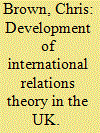

|
|
|
|
|
| Publication |
2011.
|
| Summary/Abstract |
British International Relations (IR) theory is distinguished by a concern with institutions and norms, and by an emphasis on history, philosophy, and law rather than the formal methods of the social sciences; in both respects, but especially the latter, it differs from American IR theory. The origins of British IR theory are traced, and the importance of the 'English School' (ES) is stressed, partly because of the work it stimulates, but also because of its role as a brand which helps to establish the independence of British IR from the otherwise dominant American profession. Along with ES scholarship (pluralist and solidarist), political theory and IR, and critical theory, including critical security studies, are the major areas where contemporary IR theory in Britain is located. This is likely to persist, but the generally critical approach taken to social scientific theorizing may be changing, with the increasing importance of historical sociology and critical realist work. It may also be the case that the privileged status of IR theory in British IR may be under challenge.
|
|
|
|
|
|
|
|
|
|
|
|
|
|
|
|
| 4 |
ID:
095261
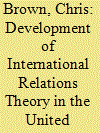

|
|
|
|
|
| Publication |
2009.
|
| Summary/Abstract |
British International Relations Theory (IRT) is distinguished by a concern with institutions and norms, and by an emphasis on history, philosophy and law rather than the formal methods of the social sciences. In both respects, but especially the latter, it differs from American IRT. The origins of British IRT are traced and the importance of the 'English School' is stressed partly because of the work it stimulates but also because of its role as a brand, which helps to establish the independence of British International Relations (IR) from the otherwise dominant American IR. Along with the English School scholarship (pluralist and solidarist), work on Political Theory and IR, and Critical Theory, including Critical Security Studies, are the major areas where contemporary British IRT is located. The article argues that this trend is likely to persist, but the generally critical approach taken to social scientific theorizing may be changing, with the increasing importance of historical sociology and critical realist work. It may also be the case that the privileged status of IRT in British IR may be under challenge
|
|
|
|
|
|
|
|
|
|
|
|
|
|
|
|
| 5 |
ID:
176033
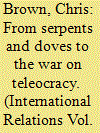

|
|
|
|
|
| Summary/Abstract |
In one of his earliest papers, ‘Serpents and Doves in Classical International Theory’ (1988), Nick Rengger set out themes that would be important to him for the next thirty years, including a Rortyan/Oakeshottian commitment to conversation as the appropriate mode of human inquiry, with the premise that there is no truth to be discovered, and a healthy scepticism directed towards reformist projects in international relations. These themes are present in his final works on just war and the anti-Pelagian imagination, but in a new, and less attractive, more dogmatic form. His critique of ‘teleocracy’ had hardened into something that no longer resembled a conversation, and his critique of progressivism involved the burning of a multitude of straw men. In 1988 Rengger aspired to be one of Rorty’s ‘edifying’ philosophers, by 2018 he seemed to have become committed to a system.
|
|
|
|
|
|
|
|
|
|
|
|
|
|
|
|
| 6 |
ID:
152106
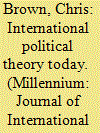

|
|
|
|
|
| Summary/Abstract |
The four books under review offer very different takes on the nature of International Political Theory, but still display certain, cross-cutting, similarities.
|
|
|
|
|
|
|
|
|
|
|
|
|
|
|
|
| 7 |
ID:
050822
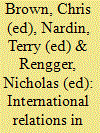

|
|
|
|
|
| Publication |
Cambridge, Cambridge University Press, 2002.
|
| Description |
xii, 617p.
|
| Standard Number |
0521575702
|
|
|
|
|
|
|
|
|
|
|
|
Copies: C:1/I:0,R:0,Q:0
Circulation
| Accession# | Call# | Current Location | Status | Policy | Location |
| 047825 | 327/BRO 047825 | Main | On Shelf | General | |
|
|
|
|
| 8 |
ID:
074800
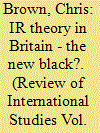

|
|
|
| 9 |
ID:
141221
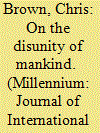

|
|
|
|
|
| Summary/Abstract |
Martin Wight’s fragmentary comments entitled ‘The Disunity of Mankind’ are by no means a major work, but they are interesting in the context of contemporary cosmopolitanism and in terms of helping us to assess the substantive content of Wight’s approach to International Relations.
|
|
|
|
|
|
|
|
|
|
|
|
|
|
|
|
| 10 |
ID:
155785
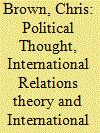

|
|
|
|
|
| Summary/Abstract |
The relationship between political theory, including the history of political thought, and International Relations theory, including the history of international thought, has been, and to some extent remains, complex and troubled. On both sides of the Atlantic, the mid-twentieth century founders of International Relations as an academic discipline drew extensively on the canon of political thought, but approached the subject in an uncritical way, while political philosophers largely disdained the international as a focus. This changed in the 1970s and 1980s, with the emergence of the ‘justice industry’ based on critiques of Rawls’ A Theory of Justice and a consequent recovering of the past history of cosmopolitan and communitarian thought. A new discourse emerged in this period – International Political Theory – bridging the gap between political thought and international relations and stimulating a far more creative and scholarly approach to the history of international thought. However, in a social science environment dominated by the methods of economics, that is, formal theory and quantification, the new discourse of International Political Theory occupies a niche rather than existing at the centre of the discipline.
|
|
|
|
|
|
|
|
|
|
|
|
|
|
|
|
| 11 |
ID:
099019


|
|
|
|
|
| Publication |
London, Routledge, 2010.
|
| Description |
x, 313p.
|
| Standard Number |
9780415564601, hbk
|
|
|
|
|
|
|
|
|
|
|
|
Copies: C:1/I:0,R:0,Q:0
Circulation
| Accession# | Call# | Current Location | Status | Policy | Location |
| 055273 | 327.101/BRO 055273 | Main | On Shelf | General | |
|
|
|
|
| 12 |
ID:
113847
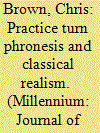

|
|
|
|
|
| Publication |
2012.
|
| Summary/Abstract |
The 'practice turn' in International Relations seems on the face of it to be a very promising development; generally associated with Bourdieu and Foucault, it can also be seen as linked to the Aristotelian notion of phronesis (prudence or practical wisdom) and to the classical realist virtue of 'prudence' (prudentia). There are family resemblances here, but also differences; for Aristotle and the realists, practical wisdom is associated more with the intellect, while the 'practice turn' places great emphasis on the role of habitual behaviour. Writers as diverse as Flyvbjerg and Macintyre have argued for a 'phronetic social science' as an alternative to neo-positivist conceptions of the role of the conduct of social enquiry - but the classical realists could argue that they have already provided a 'phronetic international relations theory' . Still, the implications of Aristotle's comment that 'prudent young people do not seem to be found' need to be confronted. Is 'practical wisdom' something that can be achieved by study, or is it only achievable in the context of the kind of lived experience that few students of International Relations or International Political theory of whatever age can actually claim?
|
|
|
|
|
|
|
|
|
|
|
|
|
|
|
|
| 13 |
ID:
167184
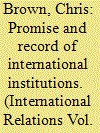

|
|
|
|
|
| Summary/Abstract |
In 1919 the attempt was made to reset the institutions governing international relations, with new patterns of expected behaviour and new international organisations. The key organisation, the League of Nations, effectively remains in place, albeit rebranded as the United Nations, but in 2019 great power relations have reverted to pre-1914 modes of conduct; attempts to extend the range of international institutions after the end of the Cold War have failed at the level of the central system. Outside of this central system, an extensive human rights regime, new notions of sovereignty and the development of international criminal law have produced a new set of institutions and expectations, an embryonic ‘global polity’ based on post-1945 European political experience and extending to democracies in Latin America and Africa. The rise of populism is placing strains on this global polity and the relations between this mode of doing international relations and that of the three major powers is also a source of tension – the fate of the liberal internationalist ideas set in train in 1919 remains in the balance.
|
|
|
|
|
|
|
|
|
|
|
|
|
|
|
|
| 14 |
ID:
078892
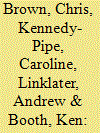

|
|
|
|
|
| Publication |
2007.
|
| Summary/Abstract |
In this roundtable, four scholars talk about different aspects of the future of the discipline. The occasion for the debate on 21 July 2006, before a large audience of invited academics and students, was the opening of a purpose-built new home for the Department of International Politics at the University of Wales, Aberystwyth - the world's first such department. Below are printed edited versions of the presentations of Professor Chris Brown (Head of the Department of International Relations at LSE, and former Chair of the British International Studies Association, BISA), Professor Caroline Kennedy-Pipe (then Chair of BISA, and Professor of International Relations at the University of Sheffield), Professor Andrew Linklater (the tenth Woodrow Wilson Professor at the Department of International Politics, University of Wales, Aberystwyth), and Professor Ken Booth (former Head of Department at the University of Wales, Aberystwyth, former Chair of BISA and E. H. Carr Professor).
|
|
|
|
|
|
|
|
|
|
|
|
|
|
|
|
| 15 |
ID:
090147
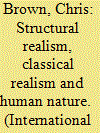

|
|
|
|
|
| Publication |
2009.
|
| Summary/Abstract |
Kenneth Waltz's Theory of International Politics is a modern classic, and deserves to be read the way classic texts ought to be read, i.e. in context and in its own terms. Recovering the context in this case is difficult because of the changes in the discourse since 1979, but one difference between the contemporary and the current reception of the text does seem clear - Waltzian structural realism (or neorealism) is now, but was not then, seen as breaking with the traditions of classical realism. How is this discontinuity to be understood? Part of the answer lies in the rhetoric employed by participants in this debate, but, more substantively, there is a genuine disagreement between neorealism and classical realism over the role played by human nature in international relations. Waltzian neorealism appears, contrary to the tradition, to reject any major role for human nature, describing theories that emphasise this notion as `reductionist'; however, on closer examination, the picture is less clear-cut. Waltz's account of human nature can be related quite closely to the major strands in the realist genealogy, but at a tangent to them. Interestingly, and perhaps unexpectedly, it is also compatible with at least some of the findings of contemporary evolutionary psychology.
|
|
|
|
|
|
|
|
|
|
|
|
|
|
|
|
| 16 |
ID:
077210
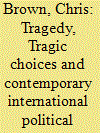

|
|
|
|
|
| Publication |
2007.
|
| Summary/Abstract |
The essence of the tragic vision of the world is that human action sometimes, perhaps often, involves a choice between two radically incompatible but equally undesirable outcomes: that whatever we do in a given situation we will be, from one perspective, acting wrongly. This account of the human condition may be particularly germane to realist thought, but the absence of a sense of the tragic can be employed to critique many other areas of international political theory. Analytical political theory in general rejects the tragic vision, and a great deal of modern writing on humanitarian intervention and global distributive justice similarly refuses to accept that sometimes there are no unambiguously right answers; that to act is, necessarily, to do wrong. The unwillingness to admit the tragic dimension of human existence is not simply intellectually harmful but also politically debilitating
|
|
|
|
|
|
|
|
|
|
|
|
|
|
|
|
| 17 |
ID:
068163
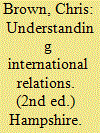

|
|
|
|
|
| Edition |
2nd ed.
|
| Publication |
Hampshire, Palgrave, 2001.
|
| Description |
xii, 296p.
|
| Standard Number |
0333948491
|
|
|
|
|
|
|
|
|
|
|
|
Copies: C:1/I:0,R:0,Q:0
Circulation
| Accession# | Call# | Current Location | Status | Policy | Location |
| 050988 | 327/BRO 050988 | Main | On Shelf | General | |
|
|
|
|
|
|
|
|
|